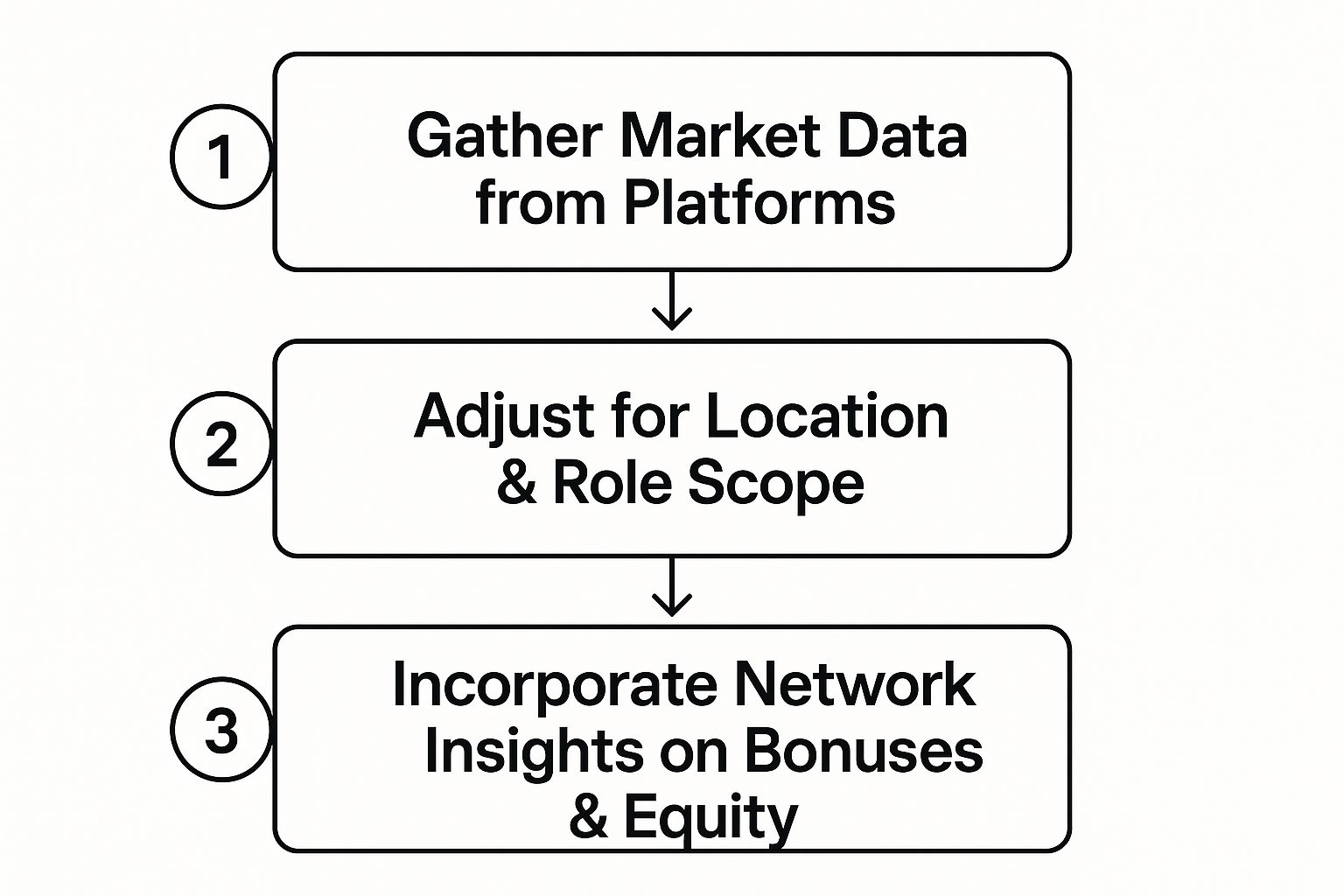How to Answer Salary Expectations With Confidence

When a recruiter asks, "So, what are your salary expectations?" your gut reaction might be to freeze up. But the best way to handle this question is actually pretty straightforward: give them a well-researched salary range, not a fixed number.
From there, you can steer the conversation back toward the value you’ll bring and what the company has budgeted for the position. This approach shows you’re prepared, keeps you from getting locked into a low number too early, and frames you as a confident professional who’s ready to talk specifics.
Why Mastering the Salary Question Matters

That salary question isn't just a formality—it’s a pivotal moment that can define your professional value from the get-go. A strong, thoughtful answer sets a positive tone for the entire negotiation and shows you know your worth in the current market.
Hiring managers ask for a few reasons. First, they need to know if you're even in their ballpark. If their budget is firm and there’s a massive gap between what you’re looking for and what they can offer, it saves everyone time to figure that out early. But it's also a test. Your answer tells them a lot about how you value your own skills and experience.
Turn a Tricky Question into an Opportunity
A lot of people see this question as a trap, designed to get them to lowball themselves. I get it. But if you flip that mindset, you can see it as your first real chance to advocate for yourself. Instead of feeling defensive, think of it as the start of a conversation about what you bring to the company.
Coming in with a well-researched range gives you instant credibility. It shows you’re a serious candidate who understands the industry. That builds respect and sets the stage for a compensation package that actually reflects your true value.
Your answer isn’t just about the number. It's about communicating your value, showing you've done your homework, and laying the groundwork for a fair negotiation.
Negotiation Is the New Normal
Fear of losing an offer is a powerful deterrent, but the data shows that negotiation is becoming more common and more successful. Today’s candidates, especially younger ones, come armed with market data and aren't afraid to use it.
For example, a recent study found that 67% of procurement professionals successfully negotiated their salary. That’s a huge number, and it points to a wider trend. Even for entry-level jobs, more than half of employers are open to talking numbers. Companies know that if their offers are rigid, they risk losing great people to competitors who are willing to be flexible.
By preparing for this conversation, you’re simply aligning with how modern hiring works. You can find more data on these trends over at Procurement Tactics.
In the end, a thoughtful answer prevents you from undervaluing yourself or accidentally pricing yourself out of a fantastic opportunity. It's the first step in building a partnership on solid ground, ensuring your compensation reflects both your skills and the impact you’ll make.
Building Your Data-Backed Salary Range
Confidence is your single greatest asset when the salary question comes up, and that confidence is built on one thing: preparation. Walking into an interview without a clear, data-supported salary range is like sailing without a compass—you’ll end up wherever the hiring manager’s budget takes you.
To avoid getting lowballed, you need to build a defensible range that serves as your negotiation anchor. This isn't about a quick Google search minutes before your call. It’s about a methodical approach to understanding what you're actually worth in the current market.
Gather Your Core Market Data
Your first move is to dive into reputable salary platforms. These sites are your best friend because they aggregate anonymous data and give you a powerful baseline for what professionals with your skills are actually earning.
Don't just check one and call it a day. The real magic happens when you cross-reference data from multiple platforms. This helps you get a more accurate picture and smooths out any weird inconsistencies you might find on a single site.
- Glassdoor and Payscale are fantastic starting points for getting a feel for the general market rates based on job title and location. Think of them as your orientation.
- Levels.fyi is an absolute must if you're in tech or a related industry. It offers incredibly granular, often verified compensation data, broken down by company and even specific job level.
- Industry-Specific Surveys are goldmines. Check with professional associations in your field or niche job boards. They often publish their own salary reports packed with highly relevant data.
To really get the most from these tools, it helps to understand how they work behind the scenes. You can get a better sense of how this data is compiled and verified by exploring resources like the one available at SalaryGuide's methodology breakdown.
This process flowchart gives you a great visual for the key steps involved in building a salary range you can stand behind.

As you can see, a strong salary expectation isn't just a number pulled from a website. It’s a thoughtful blend of hard data, real-world context, and your own professional value.
Adjust for Critical Variables
A national average for a "Project Manager" is practically useless. Compensation varies wildly based on several key factors, and you have to get specific to find your true number.
You need to drill down into the data using every filter available: location, company size, and industry. A Series B startup in Austin is going to pay very differently than a Fortune 500 company in New York City, even if the job title is identical.
Follow these steps to gather the comprehensive data needed to establish an informed and strategic salary expectation.
Your Salary Research Checklist
| Research Step | Key Action | Recommended Tools or Resources |
|---|---|---|
| Establish a Baseline | Check 2-3 major salary platforms for your target role and general location. | Glassdoor, Payscale, LinkedIn Salary |
| Drill Down by Location | Refine your search to your specific city or metropolitan area. | Levels.fyi (for tech hubs), local job boards |
| Filter by Company | Analyze compensation data by company size, industry, and funding stage (if applicable). | Levels.fyi, industry reports, company reviews |
| Analyze the Role | Compare the responsibilities in the job description to your data points. Is it a senior role? Does it manage a team? | The job description itself, similar job postings |
| Gather Human Intel | Talk to trusted contacts in your field to validate your data and get insider context. | LinkedIn connections, mentors, former colleagues |
Once you’ve gone through this checklist, you’ll have a much clearer picture of your market value.
Location, Location, Location
A salary that feels great in a mid-sized city could be way below market in a major tech hub. You can use a cost-of-living calculator to get a rough idea, but always prioritize location-specific salary data from your research platforms—it’s far more accurate.
Company Size and Stage
- Startups might offer a lower base salary but try to make up for it with a significant slice of equity.
- Mid-Sized Companies often hit the sweet spot with a competitive base and solid benefits.
- Large Corporations typically have more rigid, structured salary bands but come with bigger bonuses and comprehensive benefits packages.
Role Scope and Responsibilities
Don't get hung up on job titles alone. Read the job description like a detective. A role that requires managing a large team, a multi-million dollar budget, or niche technical skills is going to command a higher salary. Your research needs to reflect these specific demands.
A study from the Journal of Organizational Behavior found that candidates who anchored their expectations with market research received offers 8-12% higher than those who did not. Your prep work directly impacts your paycheck.
Incorporate Real-World Insights
Online data gives you the "what," but your professional network gives you the crucial "why" and "how." Some of the best insights I’ve ever gotten came from quiet conversations with people in my industry.
These chats can uncover the details that data aggregators miss, like typical bonus structures, what those equity grants are really worth, or which companies are known for paying at the top of the market.
Tapping Your Professional Network
Reach out to former colleagues, mentors, or even connections on LinkedIn who are in similar roles or work at companies you're targeting. The key is to be tactful. You don't have to ask, "So, how much do you make?"
Instead, frame your questions to gather general market intel. Try something like this:
- "I'm currently researching market rates for a Senior SEO Specialist role in the SaaS space. Based on what you're seeing out there, what do you think is a realistic base salary range for someone with my experience?"
- "I'm prepping for a negotiation and trying to understand the total compensation picture. At a company like yours, what's a typical structure for performance bonuses or equity for a director-level role?"
This qualitative feedback is the final piece of the puzzle. It adds nuance to your data-driven range and gets you ready to talk about the entire compensation package, not just the base salary. After this, you won't just have a number; you'll have a story backed by data, ready for any conversation they throw at you.
Three Proven Strategies for Your Answer

Alright, you've done your homework and have a data-backed salary range in your back pocket. Now it’s time to put that research into action.
The trick is choosing the right approach for the moment. Your strategy will shift depending on your experience, how far along you are in the interview process, and frankly, how confident you feel in your numbers. Let's walk through three field-tested ways to handle this conversation, complete with scripts you can make your own.
1. The Defer and Inquire Approach
Think of this as your go-to move for those initial screening calls. Recruiters are often just trying to check a box and make sure you're within their budget. The goal here is simple: don't name a number first.
By gracefully sidestepping the question, you keep your leverage and shift the focus to what really matters—understanding the role's actual scope and responsibilities. Answering too early, before you know what the job truly entails, is one of the most common ways people leave money on the table.
Here’s how you can frame it:
"That's a great question. Right now, I'm focused on learning more about the role and the team to see if we're a great fit. Once I have a better feel for the responsibilities, I’m confident we can land on a number that’s fair for both of us. Could you tell me what the budgeted range is for this position?"
This script just works. It's polite, professional, and puts the ball right back in their court. You come across as thoughtful and more interested in the role than the paycheck, all while encouraging them to reveal their hand first.
2. The Strategic Range Method
This is the workhorse of salary negotiation. It’s perfect for when you’re talking to the hiring manager and have a solid grasp of your market value. You're not just throwing out numbers; you're providing a well-researched range that anchors the conversation where you want it.
There's a bit of psychology at play here called anchoring. The very first number mentioned sets the stage for the rest of the negotiation. Your aim is to set the bottom of your range at a number you’d be happy with, while the top of your range becomes a fantastic—but still realistic—outcome.
Putting It Into Practice
Let's say your research shows your market value is somewhere between $90,000 and $105,000. Your ideal salary is $95,000. In this case, your strategic range should be something like $95,000 to $110,000.
- The Bottom ($95k): This is your actual target. Since companies often gravitate toward the lower end, make sure you’d be genuinely pleased to accept this offer.
- The Top ($110k): This is your aspirational anchor. It creates room for negotiation, allowing them to feel like they got a "win" by talking you down, even though you still land at or above your original goal.
Here’s a script you can adapt:
- "Based on my research for similar Senior Marketing Manager roles here in Chicago, and considering my experience driving successful campaigns, my target base salary is in the $95,000 to $110,000 range. Of course, I'm flexible and interested in learning about the total compensation package, including any bonuses and benefits."
This response is strong because it's grounded in data, frames the conversation strategically, and opens the door to discussing the full picture beyond just base pay.
3. The Confident Single Number
This is an advanced move, and it isn't for everyone. It’s best reserved for senior-level candidates or highly specialized experts who know their exact market worth and are confident in the demand for their skills. It projects authority and clarity, but it’s also higher risk. Name a number that's too high, and you could shut the conversation down completely.
Only use this tactic if you're fairly certain about the company's budget or you're in a position where you're willing to walk away if they can't meet your number. It sends a clear message: "I know my value."
Interestingly, generational trends show younger workers are getting more comfortable with this kind of directness. For example, a whopping 55% of Gen Z workers negotiate their salary, and they're more likely than any other generation to have their exact request met. This confidence comes from a shift toward data-driven, transparent conversations—a dynamic you can tap into if it fits. You can see more insights on this trend at Resume Genius.
Here’s how to deliver a single, confident number:
- "Given my decade of experience leading go-to-market strategies for B2B SaaS companies and the results I've delivered, I'm seeking a base salary of $185,000. I believe this aligns with the leadership and value I would bring to this position."
The key here is the justification. You must immediately connect the number to your specific experience and the tangible results you'll create. This isn't just a figure you pulled out of thin air; it’s a direct statement of your professional worth.
Adapting Your Answer for Any Scenario
The salary question isn’t a one-and-done deal. It’s going to pop up in different ways throughout the hiring process, and your answer needs to shift accordingly.
How you handle it on a static online form is completely different from how you'll navigate a live conversation with a recruiter or, later on, the hiring manager. A smart strategy means knowing when to be vague, when to get specific, and how to gracefully sidestep those tricky follow-up questions without losing your footing.
Let's break down how to tailor your response for every situation you'll encounter.
The Dreaded "Desired Salary" Box on Applications
You’ve probably seen it—that mandatory "desired salary" field on an online application. It’s often the very first, and most awkward, time you're asked. You can't leave it blank, but tossing out a low number can anchor you in the wrong spot before you've even spoken to a human.
Your only goal here is to get past the form without boxing yourself in. If the field is open-ended and allows text, "Negotiable" or "Market Rate" can work. But most systems demand a number.
If you have to enter a numeric value, you have a couple of options:
- Try "$0" or "$1". This is a well-known workaround that signals you're intentionally deferring the conversation. It’s a bit of a hack, but most modern applicant tracking systems (ATS) will accept it without flagging your application.
- Go to the top of your range. If you must give a real number, aim high. Use the very top of your well-researched salary range, or even nudge it a bit higher. This strategy prevents an algorithm from filtering you out for being too low and sets a strong initial anchor for future talks.
Response Strategy by Interview Stage
Your approach needs to evolve with each conversation. A quick phone screen with a recruiter requires a different touch than a deep-dive interview with your potential future boss.
Think of it as a tiered strategy. You reveal more information as you gain more leverage. This table breaks down how to adapt your answer at each step.
| Interview Stage | Your Primary Goal | Recommended Strategy | Example Phrase |
|---|---|---|---|
| Recruiter Phone Screen | Get past the screen without being anchored low. | Defer and pivot to their budget. Your goal is to get their number first. | "I'm still learning about the role's specifics, so it's a bit early to talk numbers. What range have you budgeted for this position?" |
| Hiring Manager Interview | Connect your value directly to your expected compensation. | Use a confident, well-researched range. This shows you've done your homework. | "Based on my research for similar roles in Austin and my experience in X and Y, I'm targeting a range of $85,000–$100,000." |
| Final Interview/Offer Stage | Lock in the final numbers and discuss total compensation. | Provide a firm, specific number from the upper end of your range. | "Thank you, I'm thrilled about the offer. Based on our discussions and the value I'll bring, I’m looking for a base salary of $98,000." |
This progressive approach keeps you in control. You provide just enough information to move forward at each stage, all while building your case and gaining negotiating power. For a closer look at how geography impacts these numbers, check out our guide on salary data by location.
Tackling Tricky Follow-Up Questions
Once you give your initial answer, don't be surprised if you get a follow-up question designed to dig a little deeper. Here's how to handle the two most common ones.
"What are you currently earning?"
First off, know your rights. Asking about your salary history is now illegal in many states and cities because it’s known to perpetuate wage gaps. Even if it's legal where you are, you absolutely do not have to answer this question.
The goal is to politely redirect the conversation back to what matters: the market rate for the job you’re applying for.
A smooth pivot sounds like this: "I prefer to keep my current compensation private, as I'm focused on the market value for this specific role and the contributions I can make here. My research shows that a range of..."
This response is professional and firm. It respectfully declines while immediately shifting the focus back to your value in this role—which is exactly where the discussion should be.
"How flexible are you on that number?"
This is a classic negotiation tactic. They're testing you to see if you'll immediately back down from your stated range. Don't fall for it. Instead of instantly dropping your number, stand your ground and broaden the discussion to the entire compensation package.
- Here’s what to say: "I'm confident that my range aligns with my skills and the market rate for this position. That said, I'm definitely interested in learning about the total compensation package. I'm open to discussing the full picture, including any performance bonuses, benefits, and other perks."
This reply accomplishes two things: it shows you’re firm on your value, but also flexible and open to a broader discussion. It cleverly turns the conversation toward other valuable parts of an offer, giving both sides more to work with to build a package that works for everyone.
Negotiating Beyond the Base Salary

We all tend to fixate on the base salary, but a truly great offer is a package deal. Experienced negotiators know that the base salary is just one piece of a much larger puzzle. If an employer tells you they can’t budge on their base pay offer, don't take that as the end of the line.
It's actually your cue to start a different, more strategic conversation.
Often, a company’s hands are tied by internal pay bands for base salaries, but they have a lot more flexibility in other areas. The trick is to shift the focus from a single number to the full value of the compensation package. This shows you're thinking like a long-term partner, not just a prospective employee.
Looking at the Complete Picture
When you hear "we can't go any higher on the base," that's your green light to get creative. This is where you can start tailoring the offer to what really matters to you, securing a package that fits your financial needs and personal priorities.
Before you even get to this stage, you should have a clear idea of what else you value. Is it a one-time cash bonus to cover a move? A better work-life balance? Maybe it’s a clear path for growth, backed by company-funded training. Knowing your priorities gives you a powerful menu of options to discuss.
Here are some of the most common—and valuable—perks to negotiate:
- Sign-on Bonus: A one-time lump sum you get when you start. It’s the perfect tool to close the gap if the base is just a little shy of your target.
- Performance Bonus: This is your upside. An annual or quarterly bonus tied to your work or the company's success can add a significant amount to your annual earnings.
- Equity or Stock Options: A slice of the company pie. At a growing organization, this can be an incredibly valuable part of your compensation down the road.
- Professional Development Stipend: Company funding for courses, certifications, or conferences that help you sharpen your skills and advance your career.
- Remote Work Flexibility: The ability to work from home saves you real money on commuting and can dramatically improve your quality of life.
Language You Can Use to Pivot
If the salary talk hits a snag, you need the right words to get things moving again without sounding demanding. The goal is to be collaborative, not confrontational. You're not laying down an ultimatum; you're working with them to find a win-win solution.
Key Takeaway: Frame the discussion as a mutual effort to make the total package work. This approach positions you as a flexible problem-solver, not just someone hung up on a number.
Here’s how you can smoothly pivot the conversation:
- Example 1 (Pivoting to a Bonus): "I understand that the base salary is firm at $90,000. My target was closer to $95,000, so I'm wondering if you'd be open to a sign-on bonus to help bridge that difference in the first year?"
- Example 2 (Pivoting to Development): "Thank you for walking me through the offer; I'm really excited about this role. I know the base is fixed, but professional growth is a huge priority for me. Could we explore adding a $3,000 annual stipend for professional development?"
Understanding the Broader Economic Context
Your negotiation power is also tied to what’s happening in the wider economy. Right now, global salary trends show pretty modest budget increases, which directly impacts how much companies can flex on base pay.
For instance, in the United States, companies are budgeting for average salary increases of around 3.5% for 2026. This kind of cautious spending means employers might have tight restrictions on base salaries but could be more willing to offer one-time bonuses or valuable non-monetary perks. Knowing this helps you set realistic expectations and negotiate from a place of confidence.
A solid understanding of both the role's market value and the company's likely position is your biggest asset. You can dig deeper into specific compensation benchmarks by reviewing our comprehensive salary guides by role. By focusing on the entire compensation package, you can build an offer that truly reflects your full value.
Tackling Tricky Salary Questions
Even with perfect preparation, salary talks can be unpredictable. Let's walk through a few common curveballs and how to handle them without breaking a sweat.
"I Realize My Stated Range Was Too Low. What Now?"
It’s that sinking feeling in your gut. You gave them a number, but after learning more about the job's actual demands, you know you undersold yourself.
Don't panic. This is a salvageable situation, but it requires a bit of finesse. The perfect time to bring this up is when you have the official offer in hand. At this point, the company has decided they want you, which gives you leverage. It's a natural moment to recalibrate based on new information.
You can frame it like this:
"Thank you so much for the offer! I'm genuinely excited about the possibility of joining the team. Now that I have a clearer picture of the role's scope—especially the team leadership and budget management components we discussed—I'd like to revisit compensation. Based on these additional responsibilities, a salary closer to $95,000 feels more appropriate."
This works because you're not just pulling a number out of thin air. You’re logically connecting your revised expectation to new, specific job duties. It shows your re-evaluation is based on the role's value, not just a change of heart.
"They Said My Range Is Too High. How Do I Respond?"
Hearing "that's a bit more than we had budgeted" can feel like hitting a brick wall, but it's rarely the end of the road. More often than not, it’s an invitation to start the real negotiation.
Resist the urge to immediately drop your price. Your first move should be to keep the conversation going and shift the focus from a single number to your overall value.
- Acknowledge and Inquire: Start by saying, "I appreciate you sharing that. To help me understand, could you tell me what range you've budgeted for the position?" This simple question puts the ball back in their court.
- Reinforce Your Value: You can follow up with, "I understand. My research showed this range was competitive for someone with my experience in [mention a key, relevant skill]. I'm confident my background here could bring significant results."
- Pivot to the Full Package: Show you're open to a discussion beyond just the base salary. "While my initial expectation was in that range, I'm definitely flexible and would love to learn more about the complete compensation package, including any performance bonuses, equity, or other benefits."
This strategy prevents you from caving too early. It subtly reminds them of the value you bring while signaling that you’re a reasonable person ready to find a win-win solution.
"Should I Ever Be the First to Name a Number?"
The classic advice holds true for a reason: he who speaks first, often loses. Letting the employer state their budget first is almost always the smartest play. It prevents you from unknowingly asking for less than they were willing to pay or naming a number so high it takes you out of the running.
The "Defer and Inquire" strategy we covered earlier is your best friend in most situations.
That said, there are rare exceptions. If you're a senior-level executive or a highly sought-after specialist, you might know your market value with absolute certainty. In those specific cases, stating a firm number can project confidence and anchor the negotiation in your favor. For everyone else, though, the best move is to skillfully get them to show their cards first.
"How Do I Talk About Salary When I'm Changing Careers?"
When you're switching fields, your last salary is irrelevant. Don't even bring it up. Your entire conversation needs to be anchored in the market data for your new role in your new industry.
The key is to focus the discussion on your transferable skills and the unique perspective you bring. You need to show them how your seemingly unrelated experience is actually a hidden asset.
Try this approach:
"Since I'm transitioning from finance into marketing, my focus is really on the current market rate for this type of role. My research for a Marketing Coordinator here in Chicago shows a typical range of $55,000 to $65,000. Given my extensive background in project management and budget analysis, I believe I bring a unique skill set that would justify a salary toward the higher end of that range."
This response does a few things perfectly. It shows you've done your homework, you're realistic about the new field, and you can still confidently articulate why your unique background makes you a more valuable hire.
Ready to walk into your next negotiation with unshakeable confidence? SalaryGuide gives you access to over 4,000 verified, role-specific salaries so you can build a data-backed range and secure the compensation you deserve. Stop guessing and start knowing your worth today. Explore verified salaries at SalaryGuide.
Article created using Outrank